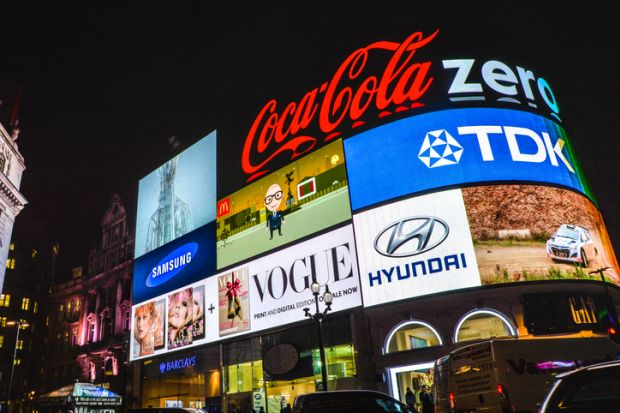Last month, Nick Isles, CEO of Condé Nast College of Fashion and Design, suggested that we stop being squeamish about higher education’s increasingly commercial mindset. But many of the measures he suggested – from selling course naming rights to establishing direct talent pipelines into corporations – are not new, and history suggests that there are some pitfalls to beware of.
In an increasingly competitive sector driven by a set of narrow graduate outcome metrics, university departments often use their open days to persuade applicants – and particularly their parents – that they have unique ties with some of their sector’s leading employers. Now corporate-branded higher education suppliers such as Isles’ are advertising how their graduates can work their way up the hierarchy in the parent firm.
Examples in the media disciplines I am familiar with seem to show that, broadly, this model works. Fifteen years ago, for instance, Bournemouth University developed a media centre with Al Jazeera and ran a series of related research initiatives, enabling its media students to understand the culture and contexts of the Qatar-based news organisation at a time when it was developing in-country news centres.
Partnerships can also provide university departments with unique access to equipment that they can’t always afford otherwise. In 2010, for instance, Buckinghamshire New University’s media department began an exclusive training route with audio products group Focusrite, which provided students with access to state-of-the-art kit in the knowledge that this would turn them into future evangelists for the brand.
But previous attempts by emerging software brands to do something similar demonstrate that partnerships don’t always have staying power. A 1990s tie-up between Ravensbourne College of Design & Communication (as it was then) and motion graphics firm Quantel Paintbox initially gave graduates a foot in the door at the BBC and the new satellite TV station, Sky, which were both early adopters and partners of Quantel. But second-generation graduates found fewer opportunities as a slew of new industry rivals made employment opportunities far more competitive and difficult to come by.
Moreover, sustainable partnerships also depend on personal relationships and corporate fortunes. Their value is only as strong as the sustained efforts of those who set them in motion in the first place. What happens when key staff in the partnership move on, or when industry partners are no longer able to underwrite continuous graduate opportunities?
And then there are the moral and reputational questions. Many in higher education are wary of becoming reliant on brands to prop up shrinking budgets in exchange for serving as their talent farms and examples of corporate social responsibility. Can we really envision a world where Coca-Cola preaches the virtues of sustainability to eager undergraduates? Are we prepared to grapple with the ethical issues within corporations that may affect the university’s own brand? Existing agreements are rarely anything more than memoranda of understanding, lacking detailed clauses about what kind of corporate conduct might nullify them. With Generation Z graduates tending to be more ethically driven, clashes between brand values and corporate ethics may impact on student recruitment.
There’s also the challenge of how to ensure academic rigour through partnered course content. The commercial and educational imperatives need to be disentangled for degrees to maintain their value.
And for all the government’s push to judge courses and institutions on graduate employment, corporations and higher education still operate at different tempos – corporate partners want immediate results, whereas HEIs tend to seek longer-term success stories. Conflicting KPIs could pose logistical challenges for longer-term partnerships.
Longevity has tended to be where there is a regional imperative to support graduate talent. An example is the University Academy 92, whose mission is to support students in Salford and Manchester who would not otherwise enter higher education to graduate directly into the workplace.
The UK government is clearly keen on the promise of commercial-educational ventures, but consumers and university partners should be mindful that establishing brand partnerships can only get them to first base. The quality of the teaching and learning experience, the range of skills acquired and – let’s be frank – the state of the marketplace that students graduate into all have a part to play in the success of partnerships, too.
Paul Springer is director of the School of Communication/Academy of Music and Theatre Arts at Falmouth University.
Register to continue
Why register?
- Registration is free and only takes a moment
- Once registered, you can read 3 articles a month
- Sign up for our newsletter
Subscribe
Or subscribe for unlimited access to:
- Unlimited access to news, views, insights & reviews
- Digital editions
- Digital access to THE’s university and college rankings analysis
Already registered or a current subscriber? Login







